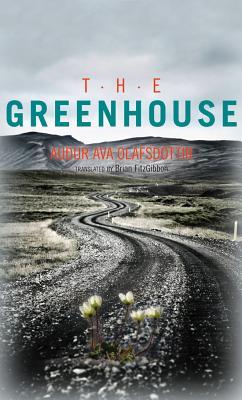
This is the story of the Icelandic Forrest Gump. He is called Lobbi, and he has an intellectually disabled brother. Athough this is never ackowledged throughout the book, he has some serious mental issues too. Some readers might see Lobbi as a real, regular, almost typical 22 years old kid. But unless I am missing the point because I am ignorant of some purely Icelandic way of approaching reality, I will put it out there: Lobbi comes across as border-line autistic. I will explain this a bit further down.
I don't like summarizing plots, but in this case it's really simple: Lobbi's mother is dead. Their shared love of tending rare roses in her greenhouse inspires him to leave everything and travel to a remote village monastery to restore its once fabulous gardens. While transforming the garden under the watchful eye of a cinephile monk, he is surprised by a visit from Anna, a friend of a friend with whom he shared a fateful moment in his mother’s greenhouse, and the daughter they together conceived that night. That is the whole book. There is little else in terms of plot development, and depending on your taste or mood, this can be really good or really bad.
Auður Ava Ólafsdóttir is an Icelandic author. I read the Italian translation, titled "Rosa Candida" (nota al traduttore e all'editore: carissimi, su "do" di "io do" l'accento non ci va. Un errore ripetuto spesso in questa edizione. Ma dove avete studiato?).
Back to the main character's personality: things happen to him and to his body often as if he was watching them on a screen. Yes, teenagers do live a bit like that, with that out-of-body detachment, but they don't rationalize that condition constantly like this guy does, and they tend to express themselves in one way or the other, while this guy is totally passive and uncommunicative.

Now, is that particularly Icelandic? Or is this something the author wanted to create? I have no idea. I know that, aside from the normal issues of a twenty year old, this man has other, very peculiar issues: very serious communication problems, and as I said, some autistic traits.
Let me be frank. If this simple, delicate book was not from an Icelandic author, I don't know if anyone would have published it. The young father with baby plot has been used many times, and with better, more coherent results, by Nick Hornby and other writers. "Iceland! A book from Iceland!" is the reason why I, and probably many others, ended up reading this book, for curiosity.
The cinephile monk might have been a strong feature, but no, he has nothing to add to the blandness of the story.
On the other hand, simplicity and quiet are the actual charm of the book, so I understand the readers who fell in love with it for its powerful soothing effect.
But quiet and delicate are attributes that very easily overlap with bland and diluted.
Nothing stands out in the whole story, nothing jumps off the page, an idea, an individual, a feeling.
It is like one of those sweet melodies that might be pleasant to listen to while they're playing, but that, once finished, are immediately forgotten.
Nothing stands out in the whole story, nothing jumps off the page, an idea, an individual, a feeling.
It is like one of those sweet melodies that might be pleasant to listen to while they're playing, but that, once finished, are immediately forgotten.
No comments:
Post a Comment